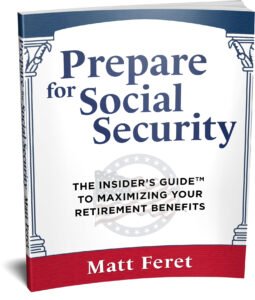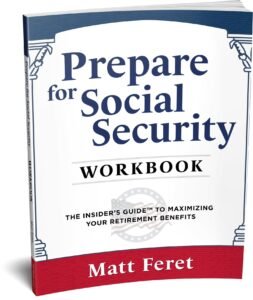#079
Share This:

In this episode of The Matt Feret Show I interview veterinarian Dr. Terie Sizemore to discuss the nuances of senior pet ownership. We discuss the benefits and risks associated with senior pet adoption and Dr. Terie shares her knowledge about the different factors seniors may want to consider before adopting, such as pet species and breed, activity level, and health.
If you enjoyed this episode of The Matt Feret Show, you may also enjoy:
Finding Purpose and Fulfillment in Retirement with Retirement Stepping Stones Author Tony Hixon
Improving Intimate Relationships in Midlife and Retirement with Courtney Boyer, M. Ed., M.S.
Listen to the episode on Apple Podcasts, Spotify, Deezer, Podcast Addict, Stitcher, Google Podcasts, Amazon Music, Alexa Flash Briefing, iHeart, Acast or on your favorite podcast platform. You can watch the interview on YouTube here.
Brought to you by Prepare for Medicare – The Insider’s Guide book series. Sign up for the Prepare for Medicare Newsletter, an exclusive subscription-only newsletter that delivers the inside scoop to help you stay up-to-date with your Medicare insurance coverage, highlight Medicare news you can use, and reminders for important dates throughout the year. When you sign up, you’ll immediately gain access to seven FREE Medicare checklists.
Quotes:
#079
Selected Link from the Episode:
Host’s Links:
All Things Medicare: prepareformedicare.com
Decoding Social Security: prepareforsocialsecurity.com
My Written Works on Amazon: www.amazon.com/stores/Matt-Feret/author/B09FM3L4WW
The Matt Feret Show YouTube: www.youtube.com/@themattferetshow
Network with me on LinkedIn: http://www.linkedin.com/in/mattferet
Follow me on X: twitter.com/feret_matt
See behind the scenes on Instagram: www.instagram.com/matt_feret/
Join our community on Facebook: www.facebook.com/themattferetshow/
Guest’s Links:
Facebook: https://www.facebook.com/terriesizemorestoryteller/
Full Show Transcript:
Announcer:
This episode of The Matt Feret Show is brought to you by the Brickhouse Agency. Brickhouse is a boutique independent health insurance agency that focuses on finding the right Medicare coverage for folks across the country. Matt's wife, Niki, is the heart behind Brickhouse. She's great at making confusing things clear and is passionate about helping people find a Medicare insurance policy that suits their individual needs. To schedule a free one-on-one appointment with Niki or a member of her team, head on over to brickhouseagency.com or simply call (844-844-6565), and someone will help you schedule a phone call or a Zoom meeting. The consultation is free because the insurance companies pay Brickhouse, not you. There's never any pressure or obligation to enroll. Your clearer, simpler Medicare journey is just a call or click away. brickhouse agency.com. Not affiliated with or endorsed by the government or federal Medicare program. Contacting Brickhouse Agency LLC will direct you to a licensed insurance agent.
Introduction to Dr. Terie Sizemore and Senior Pet Ownership with Matt Feret [1:09]
Matt Feret:
Hello everyone. This is Matt Feret, author of Prepare for Medicare and Prepare for Social Security Insider's, guidebooks, and online course training series. Welcome to another episode of The Matt Feret Show, where I interview insiders and experts to help light a path to successful living in midlife retirement and beyond. Dr. Terie, welcome to the show.
Dr. Terie Sizemore:
Yes, thank you for having me. It's a pleasure to be here.
Matt Feret:
Tell everybody what you do, how long you've been doing it, and how you help people.
Dr. Terie Sizemore:
Well, I've been a veterinarian for 37 years, and I've had the wonderful opportunity of meeting so many wonderful pet owners and their pets and through all stages of their lives, every age group that I can see from young children who are getting puppies in their family and their families growing to older individuals who really, really do count on those pets for very nice company. And I've been a nurse for 43 years, so I've done every type of nursing that there is from pediatrics and home care that way to the geriatric patients, to hospice at home. So I've seen people with their needs at every stage of their lives and how important it is for them to interact with their families and their pets.
Matt Feret:
Okay. How the heck did you go to vet school and become a nurse? How did that happen? Give me that story. That's a lot of work to do two things that take a lot of education and training.
Dr. Terie Sizemore:
Sure. Well, what happened was I graduated from high school when I was 16 years old, and then I taught nursery school. So I just loved teaching. I loved the children, I loved everything about it. And I started night school to be, I was a biology major to go, and then when I was out one night, I met an ambulance driver. So I decided that was a little segue that I wanted to do. So I drove an ambulance for the city of Cleveland for three years, and while I did that, I put myself through nursing school at Cleveland Metropolitan General Hospital. And then when I graduated, I had another crossroad. So I was either, I wanted to be a plastic reconstructive surgeon, but then one of my horses was injured and I had to go to the university. So when I did that, I saw veterinary medicine and I thought, well, this is everything.
This is medicine and my animals and my horses, and it was just the world I wanted. So then I pursued that and I was accepted and I graduated and I went to college for 11 years to get all those things done, but it was worth it. The time goes by. I tell people when they're working towards their goals, I tell them that the time will go by no matter what you do with that time. So choose well, because I've had 37 years of enjoying everything and I still did nursing even up until 10 years ago when I am dual licensed in Ohio and Florida. So when I came to Florida, you can get a job in nursing anywhere, and I was licensed, so I worked near the emergency room. I always did critical care and things like that as well. So I've done all of the different nursing you can. So the background really helped me just have the flexibility and it made me a better doctor too, because human medicine is just so much advanced. I mean, advances every single day. It's amazing.
Matt Feret:
Do you sleep?
Dr. Terie Sizemore:
I slept a little. It's funny because people ask me when I write and I said, well, midnight's a good time. So I'm in the middle of writing two different stories right now and creating more books. So it's tough. And then I have authors all over the world, so I have their work to kind of edit and put together and work with the artists on the creation of their books or editing their novels and things like that.
Matt Feret:
So tell me about that then, because, and we're going to get into topics. So, then you also have a side gig to your side, gig. Oh my gosh. Tell me the third thing you're doing.
Dr. Terie Sizemore:
Well, in 2016, I decided that with my love of teaching and all the pet owners that I had seen that I thought could just benefit from the basic information, I created three books. One is D is For Dog, one is C is For Cat, and one is H is For Horse. Now series has intended to be for cows and sheep and pigs. I love little pigs and goats and ferrets and birds and things like that to add to that. Just haven't gotten there yet, but it's in the works. And what they are is just basic, basic take home things for owners to just learn about taking the pets home, puppy proofing or kitty proofing the house, the different vaccines that are available, having puppies or kittens filled with very cute little pictures so that the material isn't quite as boring for the readers. Medicine's always been my thing.
So I'm very excited about all the functions of the liver and things like that. Most owners are not, but they do want the basic information about, well, what does this test really mean when the veterinarian offers this test? So those things are covered in their senior pets, losing pets, emergencies, things like that, just so they have it as a reference. And then I also expanded, once I did that, I expanded. So I have over 150 children's books, and you were mentioning a lot of your listeners and watchers are in their senior years, and I just signed up for Medicare. It's hard to believe that this is happening to me. I mean, that's stage that's coming, but I don't think that has to be all you do. So I mean, I kayak and I horseback ride, and I work and I create and I have everything.
In fact, I created another book called The Little Book of Big Ideas. And anybody, I mean, they're meant to be for children too, but they're meant to be for anybody of any age. And I think that keeping young and having fun things to do is always great for families and everybody else. So life's not over yet, even though Medicare came to knock on my door. So we do. I have, like you said, over a hundred children's books. We have Christmas books that we've created. We have several of those. We have educational books, cute, cute things that all, a lot of my writers are teachers too. So they've actually taught me so many things about the world and the midnight Zone and the funny animals that are out there. And it educates the little ones. I mean, everybody's got a child or a grandchild mostly in their lives, and they're all just filled with colorful pictures and information helping the young reader read and fun things.
And then for the adults, I have a lot of different novels. My one favorite novel is from Dr. Praise Madama in Mississippi, and she created the book Passion and Purpose Black Female Surgeons, and it's a collection of 75 stories of black women who became surgeons. And my one favorite, favorite doctor in here is a woman who worked at St. Jude. And she would stand at the surgery table and take little teeny tiny tumors from the chest and abdomen of children, and there were hundreds of them, and she would take them all out and then she would put in heated chemotherapy, and she increased the survival rate of those children from 16% to over 60%. And just amazing women who achieve and they use their achievements for good for others. And one of my authors is 100 years old, and I do not have her book here with me today, but she is from Brooklyn, New York, and she was an educator and became a lawyer, and she's an entrepreneur. She has businesses where she has rental properties and one property she sold in New York for $6 million, and she has retired to Florida, and she's cute. She has a little bit of a hearing issue, but other than that, she's wonderfully active and doing things. So
Matt Feret:
She retired finally at age 100.
Dr. Terie Sizemore:
But I don't think she's retired. I think she's still going strong and she's writing books and she's having some fun doing and still educating.
Matt Feret:
So you're a vet, you're a nurse, you're a business owner. Also around the education and book writing piece, you must have doppelganger, you must have three or four people, carbon copies of you running around doing this. Are you doing this all yourself?
Dr. Terie Sizemore:
Yes. Yes I am.
Matt Feret:
That's wonderful. I mean, I love hearing it. That's awesome. Wow. What a full and fulfilling life. By the way, if you ever need help with writing that ferret book, I know a guy that might be able to help.
Dr. Terie Sizemore:
Cool. Yes. Always interesting.
Matt Feret:
It's a bad joke. It's a bad joke. My name isn't even spelled the right way.
But, let’s do pets. And then we'll bring in nursing because again, as you said earlier, you've got a deep background in both and you've taken a lot of time out of your life to make other lives better, not only human lives, but our animal friends. And let's talk about the intersection of both, actually all three really, because you've written books about it.
I was looking at a survey or a study that came out a couple years ago. It was from the National Institutes of Health, and it surveyed pet owners, a little over 2000 of them. And it said that among other things that when people get older and they become a little bit more socially isolated due to whatever, if it was COVID a couple of years back, or if it is just people around them, friends dying or moving or their kids moving away, talking about social support and loneliness, is that there are emerging themes around the pros of having pets and then some cons of having pets. And I have to imagine during as people age and those things happen, life happens that there are many positives that come out in terms of having pets as the study notes time together, life purpose, meaning love, support, stress release. But then there are also some cons that they noted around financial concerns, difficulty meeting the pet's needs the death of the pet. Talk to me about humans and adults that have pets at that kind of stage or those stages of life and what that can mean and what you've seen in terms of not only pet ownership but the impact to their lives.
Dr. Terie Sizemore:
Older individuals a lot of times live alone. And so that pet is so much company to them as well, and they just do everything with them. And we don't encourage people food being given to the pets, but sometimes that's what they do as well. I am not the food police there, but I do know that they do have times when they share even meals with their pets, and so they do everything. And I lived in a mobile home and older age mobile home for a while as well too. And a lot of folks there had pets that they just love and they're the company. And like I said, pets take a special place in our hearts and they become, they're not always animals to us. They're just like little people in furry bodies, and a lot of them have very cute personalities and they do sweet things.
I know I had a little dog named Jack, and he was so cute. He loved his dad. And so every morning when I would walk them, he'd walk down our driveway, we were at the fairgrounds and it was a driveway into the fairgrounds, and he'd go see dad and jump on his lap and they'd interact for a while, and then he'd say, go home, Jack and Jack would just trot home and come back to the house and I'd put him back in the house. So the dogs kind of get used to us, and people, even if you're not a trainer, the dogs get used to us and they are trained to our life and we're trained to them as our pets as well.
Ideal Senior Pet Species and Sizes with Dr. Terie Sizemore [14:44]
Matt Feret:
What kind of pet is a good pet to have? I mean, cats, dogs, right? Those are the normal ones, but are there any other pets for people that are getting a little older? Maybe the kids are out of the house and they're thinking of moving any types of pets or breeds of dogs or cats that are a little, I guess more in tune with older adults that you've seen that would be interesting to consider?
Dr. Terie Sizemore:
The cats are always nice. They're very flexible, easy to move, easy to put in a small carrier and take with you wherever you go. And the small dogs as well. It was funny when I was younger, I think I liked the bigger dogs better, the retrievers, the Great Danes, the things like that. And then as I got older, I really had an appreciation for the smaller dogs and they just kind of go everywhere with you too, and they're very easy to take along with you. And so it depends. And they live longer as well usually. And that's really important to owners I think, because I think as we're going along in life, we're just enjoying them every day and we're having fun and doing things and they're part of our lives and our daily routine. And then one day we turn around and oh my gosh, our babies are older. And so then they have a little more needs and my heart goes out to the geriatric pets because they have special, they just need a little more attention. But they really are just wonderful even in their golden years after all the time that they've given us so much joy in our lives.
Matt Feret:
If I'm an active adult and I like to travel and that travel can take me all over the country, all over the world, more than just a quick weekend, what type of consideration, if I'm thinking about getting a pet in retirement or when I'm a little older, what kind of special consideration should I be thinking about before I go and get that rescue animal with that rescue dog? Should I be thinking about my lifestyle or what my planned lifestyle should be?
Dr. Terie Sizemore:
Yes, always. But like I said, the small dogs go everywhere. I see them over the road, truckers, they have dogs with them in their trucks, but most of the time obviously it has to be an air conditioned or a thermal controlled vehicle because the pets can get heat or cold stressed. So we need to make sure we're taking care of that need and just obviously that you have the ability to get them out here and when you're going to leave them. I know folks have had pets, they travel the world. I've seen very interesting people and in the keys, they'll park at a campground with their RVs, and so the pet usually has to stay there if they're going sightseeing or snorkeling or whatever they're going to do for the day. So the pet has to be taken care of. My girlfriend, who I love dearly, had an older pet that I was her veterinarian for Shelby, and she got a new puppy named Penny.
And it was kind of cute because sometimes people don't like to get a younger pet when they have an older pet, but when they were traveling for her husband's business and work, they would go in an RV and Shelby was older, and so the puppy was cute because Penny knew she needed water, so she dragged the water from one area of the RV over to the older pet, and it was very cute how she did that. And then one day Mary came home and gave the puppy up a treat, and then the puppy ran away and then she came back begging for another treat and Mary says, no, no, this is for Shelby. And so she went to see Shelby and the puppy had taken the treat to Shelby. So I think that a lot of times our pets love each other and also love us and just provide a lot of good things for us. So my puppy's getting a little restless, so I know, and just knowing the age of the pet too, obviously puppies need a little more attention than older dogs do. And then their nutrition, just being able to take everything with you and pack for the pet as well as for you as the traveler.
Matt Feret:
So you mentioned something I've always had a question about when you have an older pet older cat, is it okay to get a kitten if you have an older dog, is it okay to get a puppy? Will they accept it? Will they be threatened by it? What's your advice there?
Dr. Terie Sizemore:
That's a really good question. And it appears that cats really don't like change very much. So cats are a little more difficult to introduce new pets to. I've seen a lot of owners try to do that. Sometimes cat owners have to introduce all the cats at one time, and that can be challenging. And then it depends on the personality of the cat as well. I've had some good success with it. And then some other times cats don't tend to take to others so much. Now the dogs on the other hand, as long as it's a puppy, they seem to really enjoy it. And the older pets, if they're not too old or they don't have a lot of arthritis or things like that, then they like a puppy around because it really gets them excited about doing things more so they're a little more active.
How to Choose a Veterinarian with Dr. Terie Sizemore [20:32]
Matt Feret:
I want to talk more about your experience as a vet, and then I want to talk about the intersection of your nursing and taking care of people and your experience with animals and pets. Let's talk about veterinarian. You're a veterinarian piece first. Most people don't interact with veterinarians unless their pet is sick. And then there are things that are like, well, you should come in for regular checkups. Well, how much does it cost? This is usually a cash business. Oh my gosh, I have to get a tooth extracted. It's going to cost me $18 million. What the heck me, I should or give me some advice on how I should assess a vet or know that my veterinarian is good, or the place I'm going, the 24 hour emergency room piece or the little boutique that's open four hours a day. Tell me just in broad terms, how do I shop for a vet? How do I know if I've got a good one? What's the inside scoop there?
Dr. Terie Sizemore:
Well, a lot of times nowadays they have those Google reviews, so people are giving reviews on the veterinary practice all the time. So that's very easy to look at them. Word of mouth is another really good thing. If somebody really loves what their veterinarian does, then that's important too. Some of the veterinarians take time with folks and then they explain things. That's always helpful. You're right. When they're quoting 800, 800 to $1,200 for a dental cleaning, it makes it very difficult for owners to consider doing that. There are some programs that people avail themselves to that have packages where they pay a monthly fee and then they have services that they can avail themselves to. Those are helpful. The other thing is pet insurance. I don't work for any pet insurance companies, but I know some of them are very good and they are reliable.
So there is something that you can look into. And yes, I think that pet care has escalated that money. Part of that has escalated tremendously. And sometimes even just basic care is a consideration because heartworm, flea and tick medication in Florida can cost $36 a month alone just for that particular thing. So then when you add in the cost of getting the dog vaccinated, and sometimes we recommend blood work because early detection of things like kidney issues or liver issues, things like that are very helpful. So we recommend those things. And again, that can be costly, but sometimes if you have insurance, they will pay for some of those things and it's helpful. It's kind of like looking at it. And then when an accident happens, or if your puppy swallows something, to be honest with you, the puppy that I just acquired is darling, and as a veterinarian, I just thought the under-weight-ness of the puppy may be due to just being kind of ousted when it to feeding time. So if I just brought him home and got him fed, then we would be okay and on the right track. Well, there's some part of me that still thinks that perhaps he has a birth defect where some of the blood vessels are shunting improperly in the liver, and that surgery alone was $10,000 10 years ago.
Matt Feret:
10 years ago? So now it's 20, probably not, but closer.
Dr. Terie Sizemore:
I have not quoted it. So needless to say, I'm right there with every owner because the pennies only stretch a certain amount every month, every year. And yes, there are owners that love their dogs and they will do that. Some owners say they're retired and they have no children at the moment, so the cost is never a concern for them, but cost is a concern for a lot of folks on a limited budget. So there are ways I think the owners develop a relationship with veterinarians. I think sometimes even more than our human doctors. Although as a nurse, I always knew my doctor, so we always had a friendship as well as them being my doctor. But the veterinarian, it's a real special relationship too, because they love, the veterinarian loves pet, and that's always nice for the owner. It's like somebody loves my children, so I love them.
You know what I mean? And that's how it works in veterinarian medicine. I think just having, that's why I think I like the books because if you have a basic knowledge and basically what you're looking for or what sounds good to you, then you're going to know that your veterinarian is being helpful to you in a way that, and you can converse with them on a level where you understand. There's so many times I'll see a new diabetic pet and they look overwhelmed, and they are. And some people have diabetes or a family member with diabetes, so they understand that disease. And these owners for the first time are looking at their pet, I love my pet. I don't want to say goodbye, but I don't think I can figure out how to do this. I assure them that when it's all said and done, we're going to walk through them with all the instruction every day we're going to teach them everything, and they're going to be experts and diabetes before it's all over, and they are. And so there's a way to make people feel at ease. I had one horse owner and she told the veterinarian, I don't think I can give those injections to my horse. And he said, you can do it. So just the positive encouragement that owners can do what they need to do for their pet. It's always helpful in a veterinarian, and you do need to trust them. There has to be a trust level there. With your veteran.
Pet Care and Adoption Considerations with Dr. Terie Sizemore [26:35]
Matt Feret:
It sounds like you not only have to trust them, but you have to get to know them a little bit, kind of like your primary care doctor. You have to have a good feeling. You have to have a good rapport. They have to be meeting your needs and communication. They have to sit and be able to talk to you for a little bit, and you have to like them at the end of the day. So it sounds like it's almost like an interview process that people urge others to have with their own human doctor, with their vet. Quick downshift. I see a lot of commercials on TV for very expensive pet food. I think I saw one last night that had something to do with some guy said, what's this doing in your fridge? I was like, well, it's I think dog food. And he's like, why do you have dog food in your fridge?
And I wanted to go like, yeah, what do you have dog food in your fridge for? They're like, well, it's all natural. And it's basically sounds like somewhat human food, so you have to keep it refrigerated. And I don't know about you, but I grew up with cats and they got dry cat food and they seemed to do just fine. And it wasn't $50 a bag, it was meow mix and everything was great. They lived long, healthy, happy lives. Can you tell everybody listening that what's the deal with all this brand new, fancy, expensive cat and dog food? Is it worth it? Is it not? What does it do? What's your take on all of that?
Dr. Terie Sizemore:
Yeah, I tread lightly when I tread in those waters because you're right, I'm with you. I've always fed kibble. I've always fed some big name brands, but some name brands. And then they did, they come out with designer pet foods. And so you feel guilty if you're not spending remortgaging your house to buy some of the food. And, it's funny, because when you get a diabetic pet or you have a pet with urinary issues or something like that, or digestive issues, that food is very expensive. And sometimes we do need to tailor the diets to special needs. But I recently was on a podcast that asked me about the rumor that dry kibble in dogs caused cancer. And I thought, wow, this is really a big topic, and it's out there that they feel the way they process the food is carcinogenic. But I thought, I don't know. So I know for myself, I eat a lot of organic food and it's very expensive, but I think that every pet owner, and you're right, when I ask them what they're feeding and they tell me they're feeding meow mix or they're feeding pedigree or they're feeding Purina purine, Hass been feeding dogs for and cats for ages and ages, and I've grown pets up on that. I have not seen any increase in percentage clinically of cancer in pets that were fed foods. It's not like I see two or three year olds getting cancer and they fed a kibble that was known for causing cancer. And so I understand.
Matt Feret:
You don't see anything out there that's like, well, a dog is, let's just say a golden retriever has a life expectancy of 12 years, but if you feed them $50 of serving food, it will go to 15. Is that what you're saying? You don't really see evidence of that in your practice?
Dr. Terie Sizemore:
No, not at all. And the other thing is people will come in and tell me, so the kitties that have the vomiting issue very common because they groom themselves and they swallow that hair and then it becomes irritating and they can vomit from that. So a $10 tube of Cadillacs or lone or some type of hairball product is a lot cheaper than an ultrasound X-rays, blood work, this full workup for vomiting because the list for vomiting causes is a mile long. So I kind of try to start conservatively and then I build when I'm trying to sort out what's happening with a pet, and they'll say to me, but I'm feeding the food for hairballs. So then it puts me in a tough situation because I have to say, do you know there's no law that says that the pet food individuals have to tell us the truth?
Did you know that they can market, I guess, whichever way they want to? And so they market a lot on folks' emotions. And that's very difficult for me because every pet owner wants to do what's really best for their pet. And so if they're being told by a commercial that this is the best pet, this food has better protein, this food, well, 41% protein in my opinion, is way more than any pet needs, especially a dog. And I caution folks on some of that, but again, they make their decisions based on how they're interacting with their veterinarian. And so I have them ask their veterinarian for their personal opinion too, because I may differ from what someone else feels. And then there are holistic doctors who do a marvelous job. I mean, they're wonderfully intelligent and very creative with their care for the pets, but that's not a basis of knowledge that I personally have.
So you're right, and I've been doing it for 37 years, and I just haven't seen, like you said, the golden retrievers taking in the kibble. All their lives have higher incidents or a shorter lifespan due to that nutrition, as long as it's a big name brand food. I tell them, because there are some foods out there that I don't think I recommend if they're no name brands, those I don't recommend. But all the Purina's been Purina, Royal Canaan Hills, I guess Merrick, they're all very good foods. And sometimes one pet will eat one thing over another and sometimes they don't. IMEs has been making good food for a long time as well.
Matt Feret:
Yep. Thank you. What about a pet adoption shelters? I don't even know all the names, right? I read every once in a while a story about puppy farms and then we've got shelters, rescue animals. What's that landscape look like? What do you recommend people who are looking for pets or new pets do? What paths are, it's easy to say good and bad, but what pets are preferable from your standpoint in terms of getting the dog that you want or the cat that you want, or the pet that you want, and around that whole kind of infrastructure of, again, anywhere between somebody calling, you're seeing somebody on Craigslist that's got an extra kitten, and then all the way up to the puppy mills portion and stores that have animals behind glass. What are your feelings and recommendations around that environment?
Dr. Terie Sizemore:
I think it's do your homework. And part of the difficulty is, is that sometimes when you see a pet, if you're at a pet store, you kind of fall in love pretty fast. It's easy to do. And some of the pets from the pet store can come from puppy mills and things like that. So we don't know. But I've actually, I think I've adopted pets or obtained pets from puppy mill situations, and they've been very good pets for me. So some people don't mind mixed breed pets that they're rescuing. And I worked in Ohio, I managed a kennel there. Well, I managed two kennels at two different times. And the one kennel, if somebody was on, well, we had a certain number of pets that were at the end of the road for staying in the kennel, and they weren't adopted, but we had a newsman named Dick Goddard who he would put his pets on his show. And it was funny because I couldn't get him adopted in the kennel, but if I had Dick Goddard showcase the dog, I had 50 calls. So there were dogs that I knew would make wonderful pets, and did they have health problems? We're not always sure.
And you can even buy purebred dogs that you're not always sure. At first, when they did the designer breeds. I thought, this is a real racket when they're mixing poodles with Maltese’s or Yorkies with Karen Terriers. But I think what it did was it kind of took out the genetic things that were happening with the pure bred dogs that were not so positive. So I don't see all those congenital, the heart problems, the eye problems, the sometimes allergy problems, sometimes it doesn't make any difference. I still see a lot of allergy situations. But I think that mixing the breeds up helped with that. So there are folks that really have their heart set on a certain breed of dogs. They've always had springer spaniels. That's what they would like to continue having. And then there are folks that love going to the shelter and knowing that they made a difference in a pet's life, and they did. And so the rescues are out there. They're rescuing puppies from all over the place. And yes, they have some issues when you first get them. We have to worry about internal parasites. We have to worry about nutritional things, sometimes a little skin scarf, things like that. But once they get into their own home and they're taken such good care of by their owners, most of those things take care of themselves and they're good to go after that.
The Benefits of Senior Pet Ownership with Dr. Terie Sizemore [36:34]
Matt Feret:
I'm going to move into the intersection of two of your three professions, right? The veterinarian piece, then the human piece. You've been a nurse for a very long time as well. How important, and what have you observed as a nurse that how important is having pets around you when you get older or when you're ill? What impact have you seen, have pets had on the lives of humans that you've dealt with as a nurse?
Dr. Terie Sizemore:
Well, they give them purpose as well. I think as we age, we think we don't have a purpose in life who the younger people are doing everything. The younger people are chosen in Ohio, I love my life in Ohio, but after 50, I couldn't really find work much because there were 16 veterinarians applying for every job. And when I came to Florida, it's booming. They don't even have enough veterinarians. So the opportunities were much better for me, but it was really difficult to feel like, now, what do I do? What do I have to look forward to? And those pets, they give folks purpose. They give them happy moments, they can walk with them. They can go out and do things. It's kind of lonely to go out and walk in the park by yourself sometimes. But when you have your little dog with you, I see lots of people that I think are single folks too, and older folks, like I said, when I lived in the mobile home, the 55 and older mobile park, I saw everybody walking their dogs every morning, every afternoon, every evening.
You can hear them talking to them, giving them treats, things like that. And when you visit them, that pet really is a part of their life and a part of their family. So they're making them happy. And when other folks in family are busy and they don't spend as much time with their older family members, that pet is always there. And that pet's always going to greet them at the door and make them feel like the most special person in the world because that human animal bond isn't only with the human, it's with that pet too. The pets become very, very, very attached to people. And the people mean as much to the pet as the pet means to the folks who own them.
Matt Feret:
And earlier on in the show, you said you've definitely spent time with older patients. The medical term is geriatric patients, people with not only physical challenges, but mental challenges, right? Dementia and on all sorts of things like that. What impact do pets or what have you seen that pets have on folks in an area that they've got to be on under constant, near constant supervision or care?
Dr. Terie Sizemore:
Well, the pets still matter to them. And it's funny you asked that because one of my very, very dear friends is struggling with dementia. There was a while when she would call me, she knew my name. And now when she calls me, she's trying to let me think, she's remembering me, but I can tell that she doesn't know who I am, even when she's sees a picture of me, she doesn't know who I am, but she knows her dog, and she knows that dog every time her husband brings that dog to see her. And so it is very sweet. It's like I don't feel like, well, it takes second fiddle to the dog, but that dog just has meant so much to her and just been such a part of her life, and they've interacted together. She's been the caretaker for that pet for all these years. It's been, I think that dog must be 15 years old now, and so still going strong. And Mary still has a big place in her heart for that dog as well as that dog for her.
Matt Feret:
If I am looking after mom or dad or I'm a caretaker and mom or dad or both, or getting a little up there in terms of their health, not necessarily their age, maybe having some mobility issues, maybe having some dementia issues in terms of taking care of the pet or interacting with the pet. Like you said, dogs need walking, right? Cats need, oh my gosh, near constant attention. If I'm in a position where I'm looking after mom or dad or whatever, a loved one, are there appropriate times to figure out whether or not it's right to have an animal in the house or there or not? What should I be thinking around that? If we all hate thinking about this, but at some point, maybe you shouldn't be driving. And that's a very difficult conversation to have. I would imagine it's a very difficult conversation along the same lines of, Hey, you know what? I don't know if you're able to take care of Fido anymore. What's your experience and your advice around that topic?
Dr. Terie Sizemore:
Well, I can see where some folks feel that the owner really doesn't have the ability to care for the pet any longer, or the pet can become a safety issue. Because like you said, some pets will either pull you down if they're big. I know these elderly women, sometimes they come in with a Rottweiler, and I think it's not that it's not a beautiful dog, but maybe not the best dog for you. And I remember one time I was at this one clinic and there was an elderly gentleman, and he had this Labrador and Retrievers are near and dear to my heart, but this was one wild child. And when I took the, I says, I'll take the dog out of the car for you. So I took the dog out of the car and it dragged me across. In fact, I had almost pulled me down and I thought, well, were you going to do?
And he was a more elder than I am, obviously, and I thought this dog was dangerous for this man. Do you know what I mean? But he loved it. So we hooked him up with a trainer because he just absolutely refused to admit that that dog was more dog than he could handle. And that's not true with the Yorkie though, because the Yorkies are so little, but we don't want them to trip over things. When I did elderly home assessments, I always made sure that the risk, the fall falling is a big risk for elderly people.
So we take up carpeting, we have well-lit areas, things like that, but you don't want to pet sitting there in the middle of the way and they don't see it or they trip over it, or goodness forbid, fall on the pet. But that's where it takes the family to step in and say, I want your life. And it's different for everybody because I can't tell a family member that they should take care of a pet that they don't have time to take care of or a desire to take care of. But sometimes I think I wish that I could impress upon them how important that relationship is with that pet to that elderly person. And like my mom, she has one of my dogs and two of her own, and the other dogs we've lost, but she has eight or nine cats. And so my goal is that they're not friendly cats.
They're feral cats that she wanted to have a safe place to be. Some of them are very friendly, but most of them aren't. So they're not cuddly pets. And it's a burden sometimes to feel like I have to take care of these cats, but I know they're important to her, and there's enough mentation there that she knows they're here and they're special to her, and they're important to her. So I go out of my way to make sure that I've taken care of everything I can for whether it's litter boxes or feeding or getting the food that bags are heavy for her to carry from the grocery store. So yes, I have to take more time out of my busy day. And I find that time, midnight used to be a great time when Walmart was open 24 hours a day, but I do it at lunchtime.
I do that or I shop before I go to work and things like that. But I know that there does come a time when people, and when the pet has come to the age where we can no longer take care of it and its quality of life is there, then that decision is different. We do, I've seen the heartbreaking moments of when we have to say goodbye to every pet, and then sometimes folks just don't get another pet depending on their living situation. But I think then it's time to interact with that older person. And that becomes very challenging because I'll play like my dad, I took care of my dad for the last two years of his life, and we did a lot of television things together. We watched different movies together. I would take him places with me, we'd go for a ride, we'd play some games at home, whether it was cards or Yahtzee or things like that. So they need older folks, need to feel like somebody still loves them. It's easy for the pet because the pet's always going to show them how much they love them. So if you can take care of that pet and keep them safe with their owners, I think that's a very nice thing to do for someone aging and an aging pet and they do the aging pet has more needs, sometimes they have more dietary issues, sometimes they have more housebreaking issues and time out and some arthritic issues where they need some medication for that. So it is always different depending on where we're going with things.
Matt Feret:
Thank you. Is there a magic number of pets you should or should not have per person? I mean, you hear the phrase, crazy cat lady could be crazy cat guy too. And then of course, news stories that some health official found a house with a hundred cats and two dogs and some, right. There are the extremes, which you brought up earlier. There are a lot of the more you have, the more you're going to take care of. And then are you really giving the most attention that you could or the best treatment that you can? What are your thoughts around having multiples? Gosh, I'll just say one time in my life we had three cats in a pretty small living area, and that couldn't last very long for simple cleanliness reasons. Is there a ratio or does it depend on where you live? If you live in a rural area, if you live in an apartment, if you work full time, what are your thoughts around in terms of what's fair to the animal, even though you may like to have 10 of them?
Dr. Terie Sizemore:
Well, everything is, again, different for different people, but I do think that it can be cost prohibitive because like I said, my mother has all these cats, and so when you go to do flea treatment every month, it's 10 or $15 for every pet. And then the dogs, the heartworm medication is $36. So you times that by three, you're talking a hundred and something dollars for the dogs and hundreds of dollars for the cats. And sometimes the cats don't get the care that they need. When I was in Ohio, I had 17 horses, 11 dogs, nine cats, about 30 chickens and nine ducks and a goat.
Matt Feret:
So you had a farm basically?
Dr. Terie Sizemore:
Yeah. And I had 30 acres, so I had a half mile track on the farm. So the dogs and I could go on a walk around the track and I bred animals. But there came a moment when my life was really overwhelming, and so I had to rehome a lot, so I sold the horses slowly but surely. I sold the horses. I had a breeding business, so I bred standard bred racing horses, harness horses, and raced them and trained them up from babies. So I had a great life. And then the dogs needed somebody who could spend the time with them that I wasn't spending with them. The cats were a little easier because they take care of themselves a lot of the time. And the chickens, I only started with two chickens. They were so cute. They were little tiny chickens and they were adorable.
But they multiply one plus one does not equal two in the chicken world that it turned into many. So I had farms that one of my friends had a children and they loved the babies so I could farm them out to her. And the ducks, I lost a little at a time, but you're right, it depends on how much time you have and how much income you have, because depending on where you are, like Florida is the hotbed for fleas and sometimes ticks. If you don't treat those pets, then that I think is a little unfair to them. And even heartworms down here in Ohio, it wasn't quite as difficult because I was isolated on the farm, so the cost was a little different. But dog food costs money and vaccines are expensive. Being a veterinarian helps me with those costs, but everyone's not a veterinarian, so they have to pay for those services.
So you're right, it depends on, and then some people feel like they're just giving the pets a better life than no life at all feeding them. I know a lot of people down here who feed feral cats, and so they do feel like they're giving them a better life than no life at all, and they're not a starvation life. So everyone has their own opinion on that. And I think my mother has more cats than she should have, but she loves every single one of them, and they all respond very nicely to her, even if they don't know me very well.
Final Thoughts on Pet Medical Health and Conclusion with Dr. Terie Sizemore and Matt Feret [50:57]
Matt Feret:
So, veterinarian, nurse, entrepreneur, author. I know we could talk for a lot longer about the intersection of all those things, but what questions specifically around taking care of animals and veterinary care and the interaction between vets and humans as we grow older and in different ages and stages? What kind of questions or topics did I not ask about that I should have?
Dr. Terie Sizemore:
Well, you did a good job, Matt.
Matt Feret:
Thanks.
Dr. Terie Sizemore:
I think that sometimes we see veterinary medicine as a moneymaking business and people are in business to generate income. And I think being wise about what we choose to do, but I'm not an anti-vaxxer because I would not want any human to have polio or tetanus. I've seen people with those diseases obviously as a nurse, and they're devastating and vaccine eliminates that possibility. I've never seen a vaccinated person get tetanus or a vaccinated animal, get tetanus, and dogs and cats don't get that, but horses may or pigs or some of the livestock, but they do get distemper and they do get parvo and gosh forbid that anybody would get rabies, but it is still here in America. We are not a rabies free country. So those things are really things that I want to strongly encourage owners at. Preventative medicine is always the best way to go. Testing for at least heartworm disease and fecal is important because we want to keep them healthy that way. Now, there are more elaborate testings out there, and some people cannot afford those, and that's okay. But there are basic things, and dental care is, like I said, it has gotten pretty cost prohibitive for a lot of people to do dental care. But when the small dogs have dental issues and they have a lot of tartar and loose teeth and things like that, it can affect their heart health and their kidney health and shorten their lifespan.
Matt Feret:
Just like with humans, by the way. Right? Yeah. Dental care is a very important piece of overall health because it does affect all the exact same things you just listed for pets.
Dr. Terie Sizemore:
Yes. And what amazes me is I love my pet owners and they see the need for their own teeth to be taken care of, but they just because the pets, pets are wonderful, they're stoic and they don't complain unless they're not eating or showing some type of pain or swelling. Most people don't really see it as an issue, but it is. And every year that they see, I think that pets should be seen every year by a veterinarian and the older pets a couple times a year isn't so bad either, and they can keep on top of things. When we identify kidney issues early, we can help lengthen the life of those pets tremendously. And I know that that's what every owner wants for their pet is a nice long life, and that's what I want. I've had to say goodbye to so many pets as well, so I know how heartbreaking it is, and as long as we can delay that, then we want to do that. It's a funny, I looked at a Marma Duke cartoon one-time, cutest little cartoon, and Mar's little boy looks at the whole neighborhood of dogs and Marm standing there, and he goes, that's why they call them better-narians. So we do want the pets to be better and live long lives.
Matt Feret:
Dr. Terry, thanks so much for being on the show.
Dr. Terie Sizemore:
Thank you. It's been a pleasure. Thanks for having me.
Matt Feret:
The Matt Feret Show related content, publications, and MF Media LLC is in no way associated, endorsed, or authorized by any governmental agency, including the Social Security Administration, the Department of Health and Human Services, or the Centers for Medicare and Medicaid Services. The Matt Feret Show is in no way associated with authorized, approved, endorsed, nor in any way affiliated with any company, trademark names or other marks mentioned or referenced in or on The Matt Feret Show. Any such mention is for purpose of reference only. Any advice generalized statistics or opinions expressed are strictly those of the host guests of The Matt Feret Show. Although every effort has been made to ensure the contents of The Matt Feret Show and related content are correct and complete flaws and regulations change quickly and often. The ideas and opinions expressed on The Matt Feret Show aren't meant to replace the sage advice of healthcare, insurance, financial planning, accounting, or legal professionals.
You are responsible for your financial decisions. It is your sole responsibility to independently evaluate the accuracy, correctness, or completeness of the content services and products of and associated with The Matt Feret Show, MF Media LLC, and any related content and publications. The thoughts and opinions expressed on The Matt Feret Show are those of the host and The Matt Feret Show guests only and are not the thoughts and opinions of any current or former employer of the host or guests of The Matt Feret Show. Nor is The Matt Feret Show made by on behalf of or endorsed or approved by any current or former employer of the host or guests of The Matt Feret Show.















